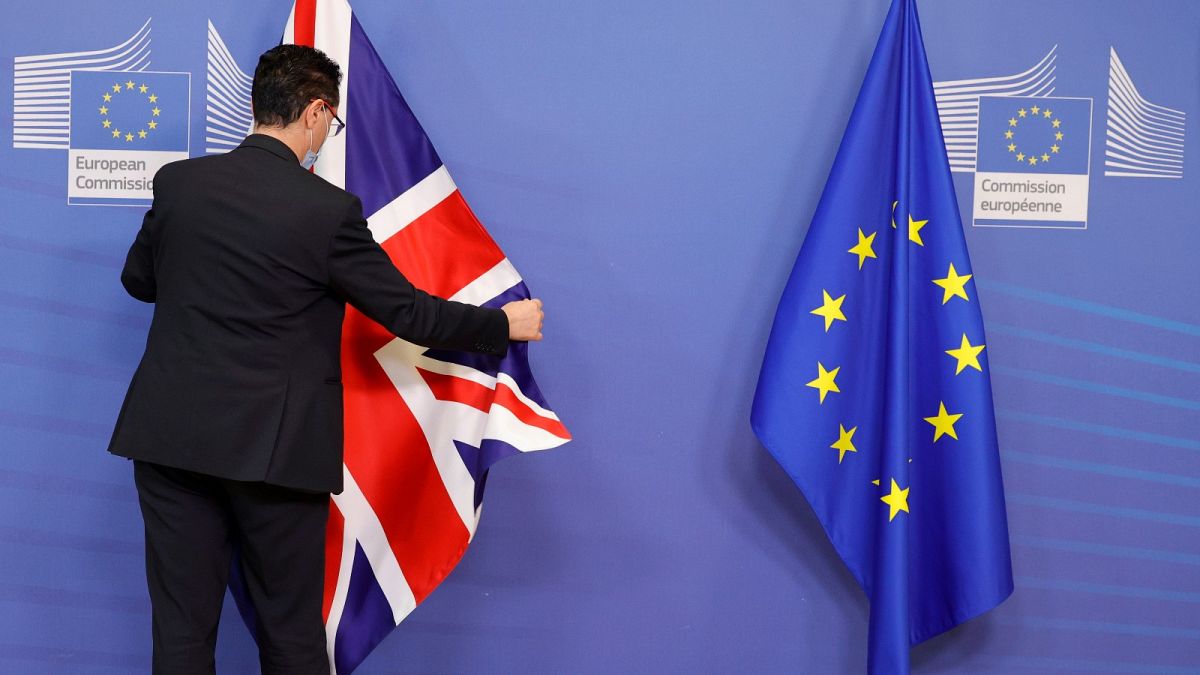The Irish Foreign Minister Simon Coveney said that his "government stands ready to work with a new UK PM."
From a sigh of relief to uncertainty about future relations, European leaders and lawmakers reacted to the political crisis in the United Kingdom amid the resignation of Prime Minister Boris Johnson as leader of his party.
Relations between the bloc and its former member have been at a low point as Johnson and his government attempt to unilaterally override parts of the Brexit treaty that apply to Northern Ireland -- called the Northern Ireland Protocol.
Irish Taoiseach Micheál Martin wished Johnson and his family well in a statement, noting however that he and his British counterpart didn’t "always agree, and the relationship between our Governments has been strained and challenged in recent times."
"Our two Governments working in close partnership is a key underpinning for peace and prosperity on these islands," he went on, adding that "we have now an opportunity to return to the true spirit of partnership and mutual respect that is needed to underpin the gains of the Good Friday Agreement."
"I would once again urge a pulling back from unilateral action, whether that be on dealing with the legacy of the past, human rights, or the Northern Ireland Protocol," he continued, before concluding that he "remain(s) committed to working with the British Government and Prime Minister in that spirit in the times ahead."
'A turning point'
The EU's executive in Brussels declined to comment on Johnson's departure from Downing Street but the Commission nonetheless stressed that "from our point of view the political developments do not change our position on the protocol or the way on which we work with our British counterparts on Northern Ireland."
"Our position is that we should endeavour to seek solutions with regards to the implementation of the protocol," spokesman Daniel Ferrie told journalists.
In Strasbourg, where lawmakers have gathered for a week of plenary sessions, tongues were not quite as tied.
"Whatever happens next, the EU must insist on the full implementation of the NI Protocol. There are no Brexit-opportunities, only Brexit-costs," tweeted Manfred Weber, the leader of the biggest group in the European Parliament, the European People's Party.
Iratxe García Pérez, leader of the Socialists and Democrats group, also commented, calling for Johnson's resignation to "mark a turning point".
"Boris Johnson's time in office has strained EU-UK relations to an all-time low," she wrote on Twitter, adding: "A plea to his successor: please stop burning bridges with us, please start building them."
Dutch MEP Guy Verhofstadt, meanwhile, said that relations between the EU and UK could only get better without Johnson.
"Boris Johnson's reign ends in disgrace, just like his friend Donald Trump. The end of an era of transatlantic populism? Let's hope so," he tweeted.
"EU - UK relations suffered hugely with Johnson's choice of Brexit. Things can only get better!"
French MEP Nathalie Loiseau called it a "day of hope for improved EU-UK relations built on trust and on the full implementation, in good faith and good will, of agreements negotiated, signed and ratified jointly."
"We are ready. Let’s unite instead of being divided. Let’s remember the meaning of friendship," Loiseau said.
Draft bill vs infringement procedures
Relations between London and Brussels have drastically soured in recent weeks after Johnson unveiled a draft bill that would enable his government to unilaterally override parts of the protocol.
The outgoing British leader, who was elected on a pledge to "Get Brexit done", negotiated and ratified the Brexit treaty. But he then turned around and argued it endangers the Good Friday Agreement it was meant to protect and threatens political stability in Northern Ireland.
Unionists, who want to retain strong links with Great Britain, have so far refused to join a devolved government until their concerns about the Protocol are addressed.
The Commission retaliated against the introduction of the draft bill by relaunching an infringement procedure against the UK that it had put on hold for nearly a year, tacking on two new procedures.
These are related to the UK’s decision to unilaterally implement and then extend grace periods waving checks on sanitary and phytosanitary products such as agri-foods, the continued lack of infrastructure and staffing to carry out customs checks in the UK, and London's failure to share trading data as required under the Protocol.
Michel Barnier, the EU's former Mr Brexit, who led the negotiations for Brussels and clinched the eleventh-hour deal on Christmas eve 2020, said that Johnson's resignation "opens a new page in relations" with the British government.
"May it be more constructive, more respectful of commitments made, in particular regarding peace and stability in Northern Ireland, and more friendly with partners in the EU," he wrote on Twitter.
